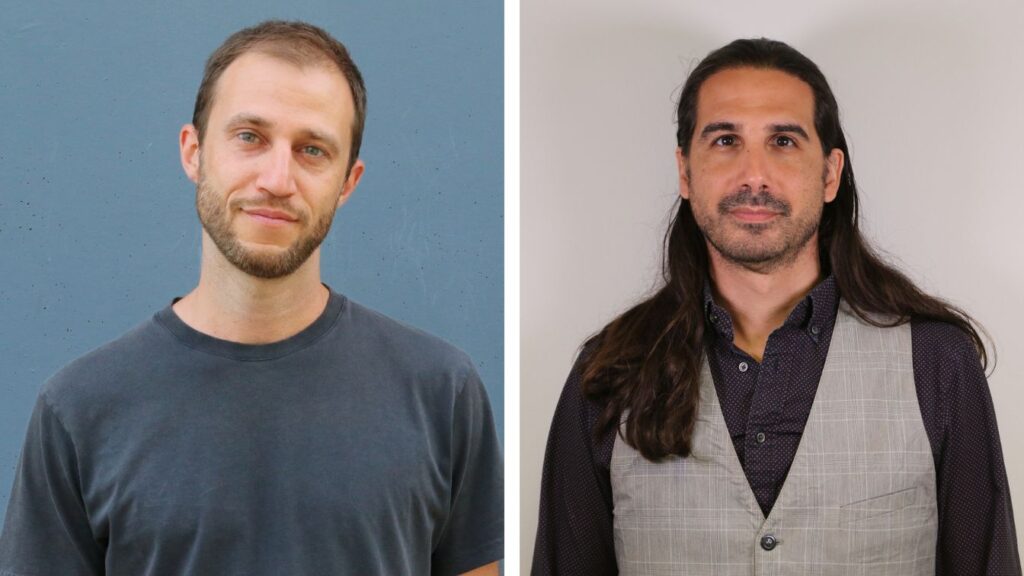The Institute for Bioengineering of Catalonia (IBEC) has welcomed two new research groups this year, led by ICREA Research Professor Javier G. Fernández and Dr Nicolò Accanto respectively. Dr Fernández’s Biointegrated Materials and Engineering group aims to integrate biological principles and living components into engineering systems, marking the beginning of the “Era of Biomaterials”. Meanwhile, Accanto’s Nonlinear photonics for neuroscience group is developing advanced optical technologies to help us understand the mechanisms that govern neuronal activity.

The Institute for Bioengineering of Catalonia (IBEC) is pleased to welcome ICREA research professors Javier G. Fernández and Dr. Nicolò Accanto as new principal investigators. Selected following an evaluation by the International Scientific Committee, they will each take charge of their own research group. Dr Fernández will lead the Biointegrated Materials and Engineering group, while Dr Accanto will lead the Nonlinear Photonics for Neuroscience group.
Biointegrated Materials and Engineering
The Fermart Lab is moving to IBEC from Harvard University and the Singapore University of Technology and Design (SUTD). This group is spearheading the Era of Biomaterials, a scientific and technological revolution based on integrating biological principles and components into engineering fields ranging from manufacturing and materials production to space exploration.
The group’s research has two main objectives: deciphering the fundamentals that govern natural materials and their design, and integrating these principles into new materials, manufacturing systems, and bio-inspired devices. To this end, the group uses a variety of tools, including molecular-level material characterisation, robotics, artificial intelligence, cell biology, and environmental impact assessments. Notable applications include biomaterials for medical interfaces, sustainable manufacturing based on natural molecules and evolutionary processes, and the development of ultra-efficient materials and production systems for colonising other planets. This interdisciplinary approach establishes the group as a leading international benchmark in bioengineering and sustainability.
Professor Javier G. Fernández trained as a physicist and obtained a PhD in nanobiotechnology from IBEC and the University of Barcelona, the latter of which awarded him the prize for the best thesis of the year. Following periods of research at the Massachusetts Institute of Technology (MIT) and the Wyss Institute at Harvard, as well as an academic career as a founding member of the Singapore University of Technology and Design, he returned to IBEC as an ICREA professor and group leader. He is recognised worldwide for his contributions to biomimetic biomaterials and sustainable biomanufacturing, particularly in relation to the control and application of chitin, the second most abundant natural polymer on Earth.
Non-linear Photonics for Neuroscience
This group is at the forefront of neurophotonics, a discipline which uses light to explore and understand the brain. The group’s goal is to develop advanced optical technologies that will enable us to unravel the mechanisms that govern neuronal activity. This will contribute to solving one of the greatest scientific challenges of our time: understanding how neural circuits work.
The group’s research focuses on studying and optimising nonlinear optical phenomena such as two-photon excited fluorescence and second harmonic generation through shaping the spatial and temporal properties of ultrafast laser beams. Based on this, the group develops innovative microscopy and photostimulation techniques that allow neural circuits to be observed and manipulated with unparalleled precision. The group also collaborates with international partners to apply these technologies in animal models, aiming to advance our understanding of brain function.
Notable developments include miniaturised microscopes for studying the brain in moving animals, dynamic laser beam shaping systems and solutions for expanding the field of view in two-photon microscopy. These innovations open up new possibilities for neuroscience research and establish the group as a leader in applied photonics.
Dr Nicolò Accanto, is an expert in two-photon microscopy, ultrafast laser beam shaping, and miniaturised optical technologies, is a key member of the group. After completing his PhD at the Institute of Photonic Sciences (ICFO) in Barcelona, he pursued his career at the Institut de la Vision and INSERM in Paris, where he led pioneering projects in optogenetics and neurophotonics. In 2023, he obtained an ERC Starting Grant to establish his own research group at IBEC, with the aim of developing optical tools to shed light on the mysteries of the brain.





